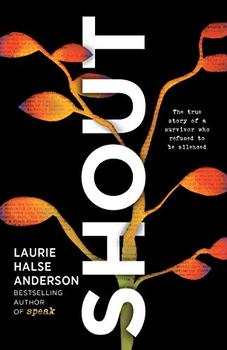Summary | Excerpt | Reading Guide | Reviews | Beyond the Book | Read-Alikes | Genres & Themes | Author Bio

This article relates to Shout
 Released in 1999, Speak was Laurie Halse Anderson's first novel and also her most controversial. Melinda Sordino, the protagonist, is raped the summer before her freshman year of high school at a house party. She calls the police but is unable to verbalize what happened, leaving the scene before they arrive. The police bust the house party, and Melinda is hated by all her classmates. She almost completely stops speaking but begins to heal through a project for her art class.
Released in 1999, Speak was Laurie Halse Anderson's first novel and also her most controversial. Melinda Sordino, the protagonist, is raped the summer before her freshman year of high school at a house party. She calls the police but is unable to verbalize what happened, leaving the scene before they arrive. The police bust the house party, and Melinda is hated by all her classmates. She almost completely stops speaking but begins to heal through a project for her art class.
The novel was not expected to succeed. Halse Anderson says that her editor tried to manage her expectations at the time of its release – maybe she would sell 3,000 copies in three years, and then the novel would go out of print. But 20 years later, it has sold millions of copies and been printed in 27 languages. Brave and honest, Speak began conversations about rape that had rarely occurred in public forums, and now the it is widely taught in classrooms, opening the door for conversations about sex and consent at younger ages. The novel won many awards – including becoming a finalist for the 1999 National Book Award and was on the American Library Association's (ALA) list of Best Books for Young Adults.
However, not everyone welcomed the depiction of adolescents dealing with such difficult subject matter. Speak was the 60th most banned book between 2000-2009 according to the ALA, usually on the basis of its depiction of underage drinking and sexual content. In 2010, a professor at Missouri State University claimed that the book should be banned for being "soft pornography" and "immoral" (note: he did not think that the rapist was immoral, he thought the novel was immoral for depicting sexual activity). In 2013, the novel was similarly brought to a school board for being "child pornography". Halse Anderson has become an anti-censorship advocate in response, a firm believer in the idea that sheltering young adults will deny them the coping mechanisms needed for traumas they may face.
In 2004, the novel was adapted into a film starring Kristen Stewart (of Twilight series fame). Halse Anderson attributes some of the longevity of her novel to this adaptation, but it may simply be that the subject matter is enduringly important. The Violence Against Women Act, which was the first national law requiring law enforcement to treat gendered violence as a crime rather than a private, household matter, was only passed in 1993, six years before Speak debuted.
Since then, the National Sexual Violence Resource Center was established in 2000, and April was designated Sexual Assault Awareness Month by President Barack Obama in 2009. As a culture, we've taken huge strides in discussing rape and sexual assault (and equally as important, we've been discussing how we discuss rape and sexual assault). There's been the publicizing of sexual assault rates in the military and on college campuses. There's been Brock Turner, and before him, there was the notorious Steubenville rape case. More recently, there's been #MeToo and Christine Blasey Ford's testimony and Bill Cosby and R. Kelly and Cardinal George Pell.
Simply put, Speak has endured for 20 years because it's had to. For 20 years the novel has opened the doors for survivors to come forward, initiated a cultural conversation about how we handle assault, and demanded education on consent and sex.
Filed under Books and Authors
![]() This "beyond the book article" relates to Shout. It originally ran in April 2019 and has been updated for the
March 2020 paperback edition.
Go to magazine.
This "beyond the book article" relates to Shout. It originally ran in April 2019 and has been updated for the
March 2020 paperback edition.
Go to magazine.
Your guide toexceptional books
BookBrowse seeks out and recommends the best in contemporary fiction and nonfiction—books that not only engage and entertain but also deepen our understanding of ourselves and the world around us.